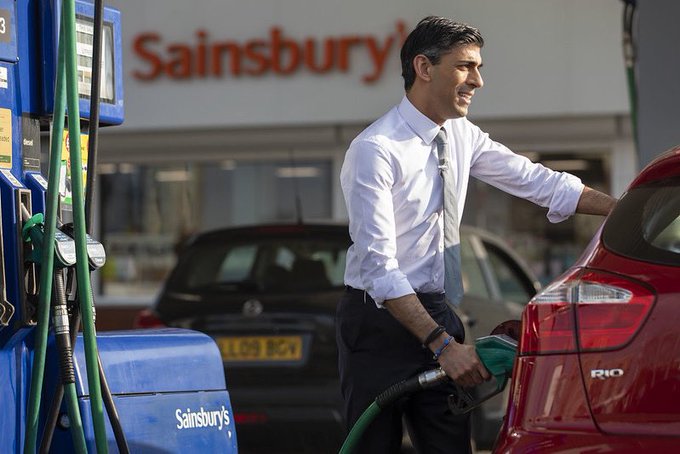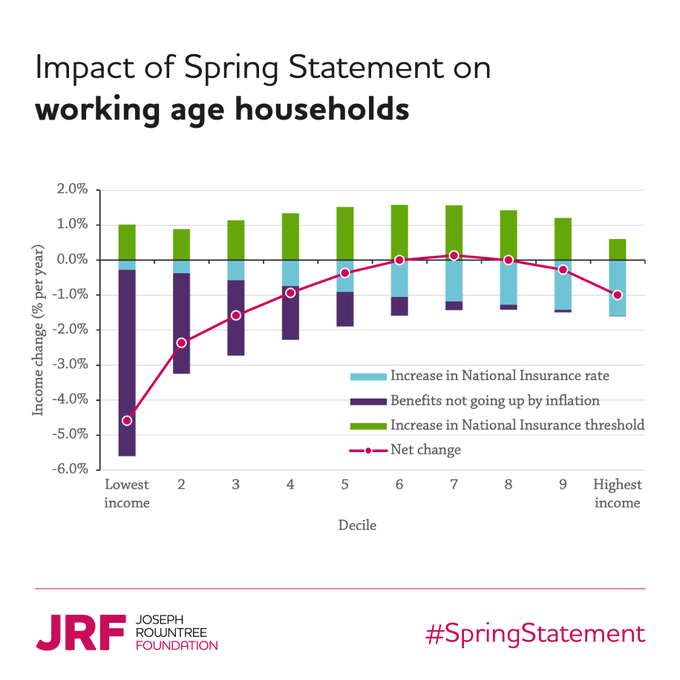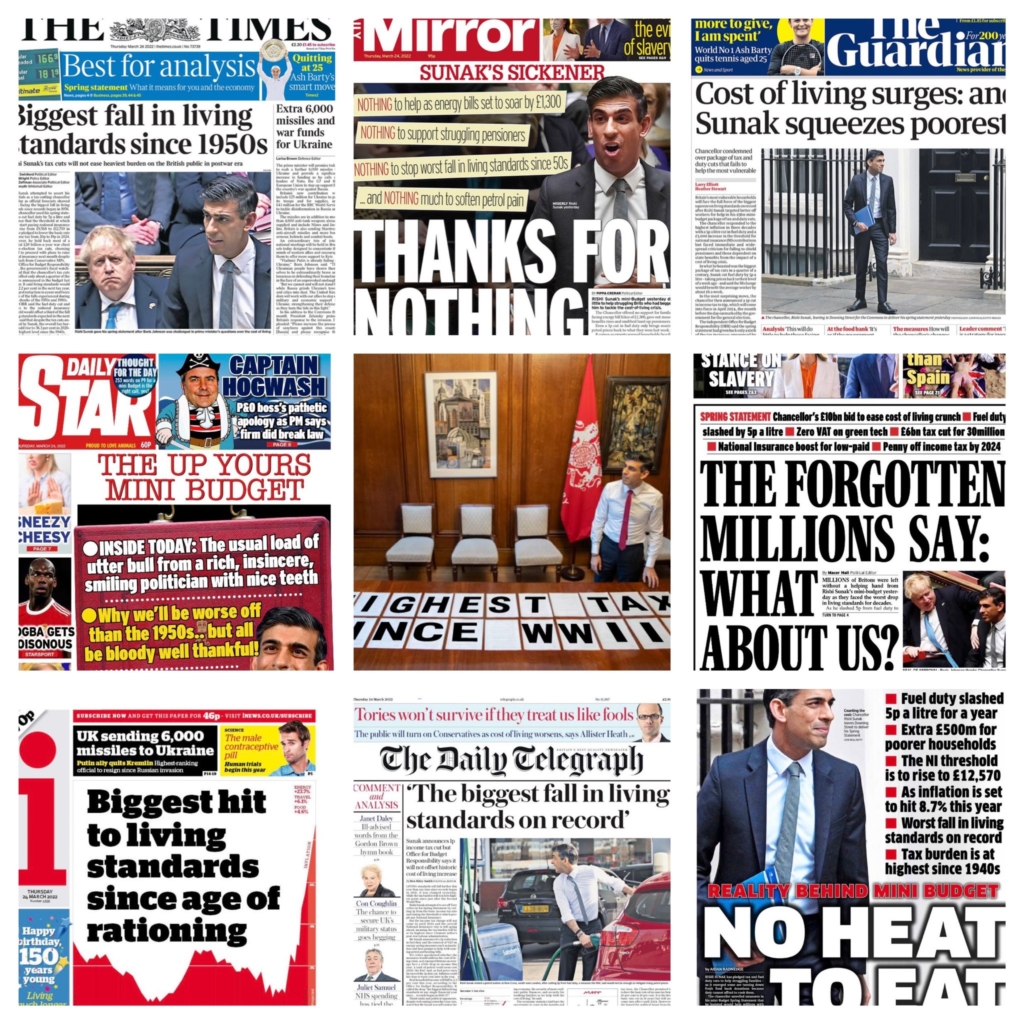When Trickle Down Means Taking the Piss

If you expected nothing then your expectations will have been exceeded. Sunak’s fumbled Spring Statement was a statement of utter contempt providing nothing for those on benefits, nothing for those on universal credit, nothing for struggling pensioners, nothing for people with disabilities, nothing to help those in energy poverty (that’s just about everyone now). But if the JRF’s graph spells out how the economy is being arched on the backs of the poorest, what it doesn’t show is how the Chancellor has made a massive political miscalculation.

Sunak has descended from media darling and ‘Dishy Rishi’ to a radically exposed and wildly unpopular figure in a twenty-four-hour period. Sunak’s wife’s extraordinary wealth [Akshata Murthy, owns a £500 million stake in the IT firm Infosys, which operates in Moscow], and his own botched PR stunts on the forecourt have made him both laughing stock and hate-figure.
His descent has been rapid and colossal, triggered by his own cynical maneuverings. He’s a figure who is so tone-deaf and politically inept it makes his neighbour in Downing Street look sure-handed. Sunak has lived a gilded political life and this may have contributed to his botched 24 hours. He was parachuted in at the first asking into one of the safest Tory seats at the age of just 34, and he was made Chancellor just six years later. As you consider the appalling consequences of his Spring Statement it’s worth thinking about that level of privilege.
Despite figures racing from all corners of the Conservative Party to provide cover for the Chancellor (here Ruth Davidson is trundled out) the impact of the Statement has been politically disastrous. In contradiction to Davidson’s framing that this was all about the left-wing media, the actual representation across the newspapers and broadcast media was uniform (and scathing):

There should be no sympathy for a man who chose to use a social crisis as a tool in his political game-playing. Nor should this be seen as a flash in a pan, it is part of a wider longer deeper economic and social crisis that millions of people have been living with for a very long time. As Oxfam tells us the number of people living in poverty almost doubled from 7.3 million in 1979 to 13.5 million in 2008 and we are seeing “inequality levels last seen in the 1920s”.
Broken Myths
This deepening crisis smashes a number of myths, the first and most basic is one that is widely assumed to be true, the idea that economic growth is shared. ‘Trickle-down’ economics or the new jargon of ‘leveling-up’ is just gaslighting. From 1993 to 2008 we had fifteen years of economic growth alongside widening immiseration poverty and growing inequality. This needs to be understood.
The Tories are exposed like never before by Sunak’s personal disaster.
As Labour’s Zarah Sultana puts it:
Rishi Sunak is taking the piss.pic.twitter.com/oKUjOgk6T5
— Zarah Sultana MP (@zarahsultana) March 24, 2022
This has consequences and a whole series of other shibboleths have fallen.
The other myths that we’re being gaslighted on include:
1. “This is all about Ukraine”, which has a sideline of “we all have to do our bit for Ukraine”, as if mass poverty is somehow part of the Blitz spirit, a relic-meme from the Brexit Glory Days (Sunlit Uplands coming soon, honest).
2. Another popular one is “Rishi can’t fix everything”, a line paraded by Sunak himself with a doleful shrug and repeated ad nauseam in the media. This was trotted out by Annabelle Denham from the IEA – giggling her way through a weird defense of Sunak on Good Morning Scotland as if she was discussing the latest soap opera: “It could have been worse … there was no way it was going to magic away all of the cost of living problems … we cannot expect government to magic that away” she said weirdly blaming the costs of living on high taxes and green energy. Quite what she was doing on Scottish radio is a mystery known only to the programme’s producers.
The idea that Rishi is just some geezer toddling about who would do more if only he could is grotesque. As Miatta Fahnbulleh from the New Economics Foundation pointed out:
“He could have bolstered social security with a £15bn boost to give families at the sharp end of this crisis support worth £4,700 for a working couple with children; he could have opted to put a windfall tax on energy producers’ excess profits to soften the rise in energy prices for millions of families; and he could have invested £12bn in upgrading and insulating our homes, helping millions to reduce the energy they use.”
3. Third, the idea of the deserving poor (in work) and the undeserving poor (on benefits) was resurrected with the language of “hard-working families” cast about all day.
4. Fourth the idea that this is some sudden crisis is just not true. This is the same Tory government that deliberately pushed 840,000 people into poverty with its £20 cut to Universal Credit. We seem to have a Memory Hole.
5. Fifth the economic system is so broken that the sort of narrative peddled by Martin Lewis and others, and a whole surround-sound of “top tips for managing” – an approach that frames systemic problems as personal management issues – is now fundamentally over. Such is the level of social suffering that the myth sustained for some time that you can somehow “manage your way out of it” is now rightly seen as offensive.
6. Finally the story we’re told about figures like Sunak taking “tough decisions” as if they are sort of benevolent father-figures is smashed by Jeevun Sandher:
‘They’re not tough for him, they’re not difficult for him, and they’re not difficult for people like him.’
Rishi Sunak has ‘chosen not to tax’ the most well off in society in his Spring Statement, economist @JeevunSandher declares.@IainDale | #CrossQuestion pic.twitter.com/smEnk8l2SX
— LBC (@LBC) March 23, 2022
But it would be a mistake to step into the game of just personalising politics. Sunak’s deeply cynical political fumbling might lead to his downfall or it might not, it doesn’t really matter. The Conservative Party are full of such characters and there would be a queue of replacement identikit ideologues as soon as he was demoted.
Sunak’s Spring Statement was a cynical political choice. As Paul Kissack from Joseph Rowntree has outlined: “Faced with the greatest threat to living standards for generations, it is impossible to justify the decision to leave almost everyone at the sharp end of the crisis out in the cold. Rather than strengthen the support available, he chose to cut benefits in real terms, leaving households in poverty £445 out of pocket for the year ahead; 600,000 more people will be pulled into poverty by this decision. Around a quarter of them are children.
The new tax changes that were announced deliver nothing for people who are unable to work and those earning too little to pay tax or national insurance. Many low earners who earn just enough to gain from the rise in the national insurance threshold will find more than half the gain tapered away through the subsequent reduction in their universal credit.
The chancellor’s response to challenges on his lack of action was that he had prioritised people in poverty in his budget last autumn. That, you might recall, was when he cut universal credit by £20 a week, in the face of widespread opposition, including from many of his own backbenchers.”
Unlike #Partygate this statement will have deep ramifications because they have an impact in the real world and will do for months and years to come.

Help to support independent Scottish journalism by subscribing or donating today.

He also punished pensioners by abolishing the triple lock which means pensions only rise by 3.1%. Inflation today is 6.2% and rising. It should also be remembered that the OAP is not a benefit. We have worked for it, paid into the fund and earned it.
At a time when we are seeing the lengths that some Ukrainian refugees are going to so as to preserve their companion animals, those who manage to make it together to the UK may be entering a country where (economic, post-lockdown, cultural) conditions are forming for another great pet holocaust as happened in the early months of World War 2. https://www.peta.org.uk/action/ukraine/
‘Trickle down ‘ economics did not work before and it will not work now. Since George Osbourne we have had a succession of corrupt, incompetent Chancellors who lack understanding of economics and economic theory. As an old unreconstructed Keynesian, I know that the ‘market’ economics practised by the Tories since Thatcher is just unsubstantiated assertion – with no proof. I refer you again to the speech by Aneurin Bevan, Manchester 4 July 1948 – ” What is Toryism but organised spivvery…..”
Bill
@Bill, it sounds like you might like to play the short and easy-to-play computer game Democratic Socialism Simulator, where you chose between policy options presented by your advisors, so you can build socialism and save the environment as the President of the USA, surviving elections, containing lobbyists, and managing the demands of the electorate and the obstructions of Congress:
https://molleindustria.org/demsocsim/
Not only did I manage that in my first game, but I ended on a healthy budget surplus too. In your face, Chancellor Sunak!
Many years ago, I played, on an early Apple computer, the Guns versus Butter game. If you overdid the butter, Hitler won the war, if you overdid the guns, millions died of starvation. Perhaps it would have been better had some of the incompetent Tory Chancellors had played the same game and also the one you have recommended. The only part missing in all games is how to get and keep the kleptocrats sweet
Regards
Bill
Even Sim City would be good training for politicians. There are various games on the net that incorporate tradeoffs in politics. Maybe it should be compulsory for anyone wanting to enter politics to get good scores. Or play opponents with different ideologies.
But then I tend to think politics either attracts loonies or turns people into loonies, with a few honourable exceptions.
Undoubtedly, as people more qualified than I – a pensioner, who happens to be in the 7th decile of the graph you use! – have pointed out, this is a budget by an obscenely wealthy man for people in his tiny economic class. The ‘loss’ that hundredth-of-a-centile of a population will experience will be less than that experienced by an elephant bitten by a gnat.
These, as Sleeping Dog indicates in his post, are wilful choices. Despite what the BBC and the rest of the rightwing commentators say, there are alternative choices which can be made and these choices can redistribute the things of the world economy in a much more equitable way to give us all a good standard of living – food, shelter, warmth, clothing, time to socialise, and to great cooperative and empowered communities.
And, despite the close-down question always posed by the BBC, when an alternative is presented – “And who is going to pay for all this?” – there are valid and workable alternatives. The world (and, indeed, national) economy is NOT the same as the household budget. The two are complementary parts, with the governmental part, ensuring a balancing of powers and redistribution of wealth whenever large inequalities appear. There will always be some inequalities, but the disparity between the most wealthy and the least should be much less than it is now.
@Alasdair Macdonald, if we might ask whether Ukraine can afford its oligarchs, or Russia its, perhaps the BBC should be asking the question of the UK public: “Can we afford our rich?”
And amidst this crisis , the BBC continues to give oxygen to ex IEA grifters like Kate Andrews and the aforementioned Anabelle Denham as if they are not part of the same gang as Sunak. There is hope though in the kicking the majority Tory audience administered to that Hinde fella on Question Time on Thursday . Kate Andrews’s attempts to project capitalism as the rational answer to the hoovering up of capital by capitalists like the P&O chairman and Rishi Sunak, foundered on the rock that was the Tory voting woman in red who was implacable in her condemnation of the Spring Statement.
Today’s Tories are like the Republican Party in the US now.A load of crackpots who put all of their faith in self destructive shibboleths like Brexit and bullshit levelling up, while the planet is burning. The SNP are trying to mitigate Westminster’s worst excesses while being confronted with the basic failures of governance reflected in the clusterf#@k that is education and the ferry fiasco. The timid managerialism that is the legacy of Salmond is continued by Sturgeon who offers little more than the same broken capitalist nostrums but wrapped in a Saltire. Meanwhile, Andrew Wilson and his merry band of grifters at Charlotte Street Partners wait in the wings to sell Scotland to their minted clients. I genuinely fear for the future of our children and I have no faith in the political pygmies who are overwhelmed by the scale of the challenges we face.
Sunak crafted his statement to maximise his chances of winning a leadership contest. Je seems to have forgotten the world is more than the Tory party and may have ended his political career with the next election. Hopefully he will take the Tory party with him, north and south of the border.
There are already hints the MSM have tunred against the Tories. perhaps sensing that is the way to build up their circulation.
Its only 6 weeks or so to the council elections. I will observe the results with interest.
Mike Small has written an article about the present cost of living crisis without mentioning the problem at the heart of it; inflation. In the immediate future, inflation will be the most important problem for most people in Scotland and the rest of the UK.
For anybody under 40, this will mean experiencing a new way of life. ( I recall, in the late 1970s, getting a pay rise of over 20%. A year later, I was less well off.)
Inflation, as well as eating into living standards, creates a climate of insecurity for all – except the very privileged. Any attempt to help the least fortunate will be hindered by the fact that prosperous people begin to think about their own diminishing finances.
It is near certain that, as in the 1970s and 1980s, the political winners will be those who promise to ‘slay the inflation dragon’ – regardless of the cost. In Britain and the US, it was the right which triumphed then. One of the prices paid in both countries was a huge increase in interest rates. This, in turn, forced large numbers of manufacturing businesses to the wall.
Dealing with inflation is bound to be painful. Hoping that pain can be avoided tends to mean that even more pain is experienced later.
Those dancing on Rishi Sunak’s political grave – which means nearly everyone – may be jumping the gun. The most serious aspect of the present inflation is likely to be the cost of energy, particularly for household heating. This is likely to come to a head in late autumn. Sunak knows this. The time for political action will be in six months, not during a very pleasant March.
It’s interesting that, back in the ’70s we had ‘inflation’, and fifty years on we have a ‘cost of living crisis’. But that’s by-the-by.
Basically, the problem – whether you spin it as ‘inflation’ or as a ‘cost of living crisis’ – is that, in our system of exchange, there’s too much money chasing too few goods; that is, too much demand (or consumption) and not enough supply (or production) to maintain price stability. Maintaining price stability has long been recognised by political establishments everywhere as the key to maintaining a peaceful social order; people tend to get most shirty when the price of filling their bellies runs amok.
To manage this problem, the state can generally do two things: it can reduce demand through implementing policies that take money out of the system (e.g. policies that increase interest rates, taxation, and other costs of consumption, and that reduce government spending on the consumption of goods and services, etc.), or it can increase supply through implementing policies that put more money into the system (e.g. policies that reduce interest rates, taxation, and other costs of production, and that increase state spending on the consumption of goods and services, etc). In practice, different parties in government try to manage price stability by implementing whichever combination of these policies they believe will a) work, b) prevent them from being removed from power by the general public, and c) do the least violence to the ideological and material interests of their members.
Rishi Sunak, his political ambitions, and – indeed – his moral qualities, the condition of his soul, are neither here nor there. The issue is systemic.
I mean you may be having a ‘very pleasant March’ but that’s not everyone’s experience yunno …